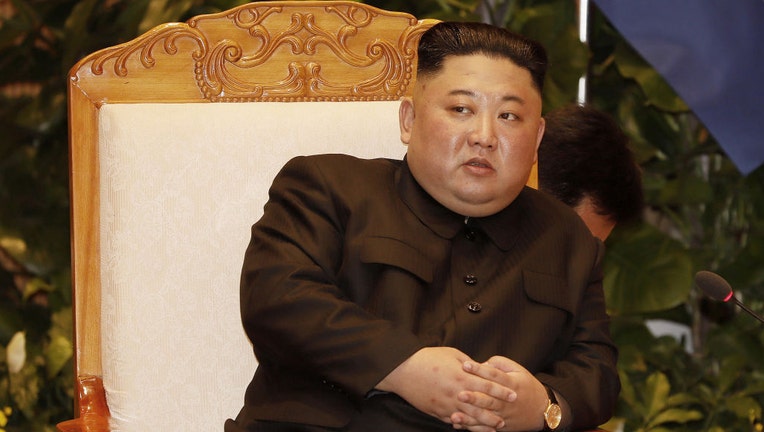North Korea's Kim Jong Un orders sharp increase in missile production, days before US-South Korea drills

FILE-Kim Jong Un, North Korea's leader, looks on during a meeting with Nguyen Xuan Phuc, Vietnam's prime minister, at the government office in Hanoi, Vietnam. (Minh Hoang/Pool via Bloomberg)
SEOUL, South Korea - North Korean leader Kim Jong Un again toured major munitions factories and ordered a drastic increase in production of missiles and other weapons, state media said Monday, as the South Korean and U.S. militaries announced they will begin major drills next week to hone their joint capability against the North’s evolving nuclear threats.
Kim’s push to produce more weapons also comes as U.S. officials believe Russia’s defense minister recently talked with North Korea about selling more weapons to Russia for its war with Ukraine.
The Korean Central News Agency said Kim visited factories producing tactical missiles, mobile launch platforms, armored vehicles and artillery shells on Friday and Saturday. He visited a spate of other munitions factories in early August.
RELATED: North Korea fires ballistic missile after US submarine arrives in South Korea
During a stop at the missile factory, Kim set a goal to "drastically boost" production capacity so the facility can mass produce missiles to meet the needs of front-line military units, KCNA said.
"The qualitative level of war preparations depends on the development of the munitions industry and the factory bears a very important responsibility in speeding up the war preparations of the (North) Korean People’s Army," Kim said, according to the report.
Visiting other factories, Kim called for building more modern missile launch trucks and said there is an urgent need to boost production of large-caliber multiple rocket launcher shells "at an exponential rate," the report said. Kim also drove a new utility combat armored vehicle, KCNA said.
RELATED: US flies nuclear-capable bombers in new show of force against North Korea
Kim has been focusing on enlarging his nuclear and missile arsenals since his high-stakes diplomacy with then-President Donald Trump collapsed in 2019. Since the start of 2022, Kim’s military has conducted more than 100 missile tests, many of them in the name of warning the U.S. and South Korea over their expansion of joint military training exercises. Many experts say Kim eventually aims to use his modernized weapons arsenals to wrest U.S. concessions, such as sanctions relief, whenever diplomacy resumes with Washington.
North Korea could perform more weapons tests soon as the U.S. and South Korea are set to start their summer military exercises next Monday. North Korea calls the U.S.-South Korean training a practice for an invasion. The allies say they have no intentions of attacking North Korea.
KCNA quoted Kim as saying North Korea must have "an overwhelming military force and get fully prepared for coping with any war" with the power to "surely annihilate" its enemies.
The U.S.-South Korean drills, called Ulchi Freedom Shield, is a computer-simulated command post exercise. During this year’s exercise that is scheduled to run through until Aug. 31, the allies said they’ll also conduct large-scale field training events, which will reportedly be the largest of their kind in recent years.
RELATED: Sister of Kim Jong Un warns North Korea ready to act against US, South
South Korea’s Joint Chiefs of Staff spokesperson, Lee Sung Joon, told reporters that this year’s UFS drills are aimed at further strengthening the allies’ response capabilities by performing exercises based on scenarios that reflect North Korea’s advancing nuclear and missile capabilities and other regional security situations. Col. Isaac L. Taylor, a spokesperson for the U.S. military, told the same news conference that the drills are designed to be "a tough and realistic exercise."
Earlier this month, the White House said U.S. intelligence officials had determined that Russian Defense Minister Sergei Shoigu spoke to North Korean officials during a visit to Pyongyang last month about increasing the sale of munitions to Moscow for its war in Ukraine.
North Korea has denied American claims that it shipped artillery shells and ammunition to Russia. But the North has publicly supported Russia over the war and hinted at sending workers to help rebuild Russian-occupied territories in Ukraine.
Kim has been trying to beef up ties with China and Russia in the face of U.S.-led pressure campaigns over its nuclear program and pandemic-related economic difficulties.
KCNA said Monday that 200-some hectares (494 acres) of farmland in North Korea’s eastern region were flooded because of Tropical Storm Khanun. Kim visited typhoon-hit areas, called for immediate steps to protect crops there and criticized local officials for failing to prevent the farmlands’ flooding, the report said.
North Korea is prone to weather-related disasters such as flooding and droughts. Observers say North Korea’s food shortage has worsened due to several reasons including draconian pandemic restrictions, unsuccessful attempts to supply grain via state-run facilities and dwindling personal incomes.

